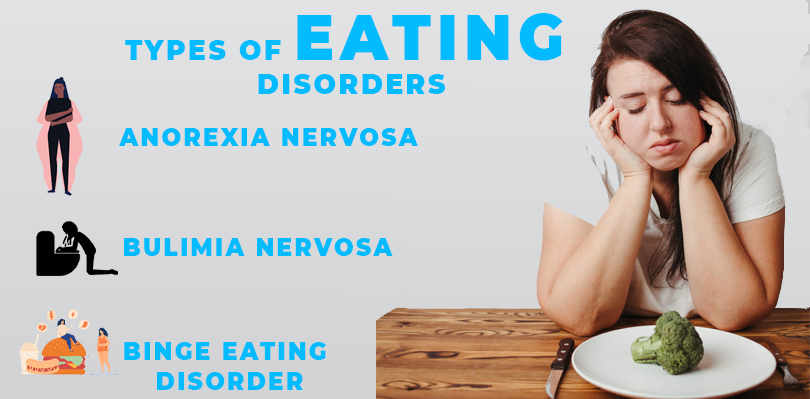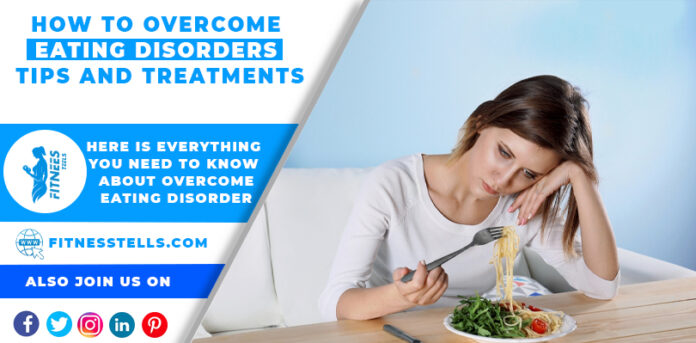Eating disorders are psychological disorders that are characterized by an abnormal relationship with food. They are serious and can have life-threatening effects. Eating disorders can affect anyone, regardless of age, gender, or socio-economic status. It is important to recognize the signs and symptoms of eating disorders and to seek help as soon as possible. This article will discuss the types of eating disorders, their causes, symptoms, treatments, and tips for overcoming an eating disorder.
Eating disorders are serious and can have life-threatening effects. It is important to recognize the signs and symptoms of an eating disorder and to seek help as soon as possible. If you or someone you know is struggling with an eating disorder, it is important to seek professional help as soon as possible. There is hope for recovery and with the right help and support, recovery is possible.
What Is An Eating Disorder?
An eating disorder is a serious mental health disorder that is characterized by an abnormal relationship with food. Eating disorders involve extreme emotions, attitudes, and behaviors related to food and weight. Also, these disorders can have serious physical and psychological effects and can even be life-threatening. They are complex and can be caused by a combination of environmental, social, and biological factors.
Eating disorders can be classified into three main categories: anorexia nervosa, bulimia nervosa, and binge eating disorder. Anorexia nervosa is characterized by a distorted body image and extreme weight loss. However, bulimia nervosa is characterized by recurrent episodes of overeating followed by purging or other compensatory behaviors. Binge eating disorder is characterized by frequent episodes of overeating without purging or other compensatory behaviors.
Types Of Eating Disorders

As mentioned, there are three main types of eating disorders: anorexia nervosa, bulimia nervosa, and binge eating disorder.
- Anorexia Nervosa is an eating disorder characterized by extreme weight loss, an intense fear of gaining weight, and a distorted body image. People with anorexia often restrict the amount of food they eat and may engage in excessive exercise or other behaviors to counteract eating.
- Bulimia Nervosa is an eating disorder characterized by recurrent episodes of binge eating followed by purging or other compensatory behaviors. People with bulimia often feel out of control when it comes to eating and may feel ashamed about their eating habits.
- Binge Eating Disorder is an eating disorder characterized by frequent episodes of overeating without purging or other compensatory behaviors. Meanwhile, people with binge eating disorder often feel overwhelmed by their eating habits and may feel guilty or ashamed after binging.
Causes Of Eating Disorders
The exact cause of eating disorders is unknown, but they are thought to be caused by a combination of environmental, social, and biological factors.
- Environmental factors such as stress, emotional trauma, or societal pressures can contribute to the development of an eating disorder.
- Social pressures such as body-shaming or unrealistic beauty standards can also lead to unhealthy relationships with food.
- Biological factors such as genetics, hormones, or brain chemistry can also play a role in the development of an eating disorder.
Symptoms Of Eating Disorders
The symptoms of an eating disorder vary depending on the type of disorder and the individual. Common symptoms of eating disorders include extreme weight loss or weight gain, preoccupation with food and body weight, distorted body image, rigid food rules, and excessive exercise. However, other physical symptoms include fatigue, dizziness, constipation, and irregular menstrual periods. Psychological symptoms include low self-esteem, anxiety, depression, and obsessive thoughts about food and weight.
How To Recognize An Eating Disorder
If you or someone you know is exhibiting any of the symptoms of an eating disorder, it is important to seek help as soon as possible. The first step is to recognize the signs and symptoms of an eating disorder. However, some warning signs to look out for include extreme weight loss or weight gain, preoccupation with food and body weight, rigid food rules, and excessive exercise. Other signs include isolation, changes in mood, and withdrawal from social activities.
Treatment Options For Eating Disorders
Eating disorders are complex and require professional treatment. Treatment options for eating disorders vary depending on the type and severity of the disorder. Treatment typically includes a combination of psychotherapy, medication, nutrition counseling, and support groups.
- Psychotherapy can help address the underlying emotional issues that may be contributing to the eating disorder.
- Also, medication can help with depression, anxiety, or other mental health issues that may be contributing to the disorder.
- Nutrition counseling can help the individual learn to make healthy food choices and develop healthy eating habits.
- Support groups can also be invaluable for providing emotional support and connecting with others who have been through similar experiences.
Tips For Overcoming An Eating Disorder
Recovering from an eating disorder is a process and no two people’s experiences will be exactly the same. However, there are some tips that may help you on your journey to recovery.
- Be kind to yourself. Acknowledge your successes and give yourself credit for the progress you have made.
- Take things one step at a time. Recovery is a process and it is important to take it one day at a time.
- Focus on self-care. Taking care of yourself is an important part of recovery. Also, make time for activities that make you feel good and focus on aspects of yourself that have nothing to do with food or weight.
- Connect with others. Connecting with others who have been through similar experiences can be invaluable for understanding and validating your feelings.
- Seek professional help. Although, eating disorders are complex and require professional treatment. Seek out a mental health professional who can help you on your journey to recovery.
Professional Help And Support For Eating Disorders
If you or someone you know is struggling with an eating disorder, it is important to seek professional help as soon as possible. Eating disorders are serious and can have serious physical and psychological effects. Seeing a mental health professional is the best way to get help for an eating disorder. However, a mental health professional can provide an individualized treatment plan that can help you on your journey to recovery. Also, they can provide support and guidance, which can be invaluable during the recovery process.
FAQs
What are the symptoms of an eating disorder?
The symptoms of an eating disorder vary depending on the type and severity of the disorder. Common symptoms include extreme weight loss or weight gain, preoccupation with food and body weight, distorted body image, rigid food rules, and excessive exercise. Also, other physical symptoms include fatigue, dizziness, constipation, and irregular menstrual periods. Psychological symptoms include low self-esteem, anxiety, depression, and obsessive thoughts about food and weight.
How do I get help for an eating disorder?
If you or someone you know is struggling with an eating disorder, it is important to seek professional help as soon as possible. Seeing a mental health professional is the best way to get help for an eating disorder. A mental health professional can provide an individualized treatment plan that can help you on your journey to recovery. However, they can also provide support and guidance, which can be invaluable during the recovery process.
What are some tips for overcoming an eating disorder?
Recovering from an eating disorder is a process and no two people’s experiences will be exactly the same. However, there are some tips that may help you on your journey to recovery. Be kind to yourself, take things one step at a time, focus on self-care, connect with others, and seek professional help.

